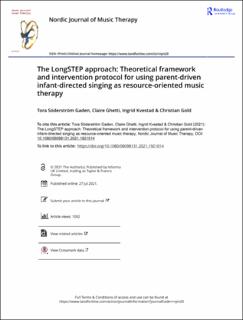| dc.contributor.author | Gaden, Tora Söderström | |
| dc.contributor.author | Ghetti, Claire | |
| dc.contributor.author | Kvestad, Ingrid | |
| dc.contributor.author | Gold, Christian | |
| dc.date.accessioned | 2022-03-07T08:48:29Z | |
| dc.date.available | 2022-03-07T08:48:29Z | |
| dc.date.created | 2021-09-08T11:43:51Z | |
| dc.date.issued | 2021 | |
| dc.identifier.issn | 0809-8131 | |
| dc.identifier.uri | https://hdl.handle.net/11250/2983315 | |
| dc.description.abstract | Introduction: Despite medical advances, preterm birth and neonatal intensive care (NICU) hospitalization are demanding and pose risks for infants and parents. Various music therapy (MT) models have suggested parental singing to promote healthy bonding and development in premature infants, but evidence on long-term effects is lacking.
Method: We present the theoretical framework and intervention protocol of a resource-oriented MT approach for premature infants and their caregivers used in the international LongSTEP trial (ClinicalTrials.gov NCT03564184). We illustrate how guiding principles manifest in MT sessions, describe frames for phases of intervention, discuss prerequisites and present hypothesized mechanisms of change.
Results: The LongSTEP MT approach is resource-oriented, emphasizes parental voice and parent-infant mutual regulation, builds on family-centered care principles, and is relevant in the NICU and beyond. Essential elements include: observation and dialogue on infant and parent needs; voice as the main musical source, with parental voice as the most prominent; active parental participation; modification of music in response to infant states and cues; and integration of the family’s culture and music preferences. The music therapist facilitates and supports interaction between parents and infant. Parents learn how to adapt principles in relation to infant development across NICU hospitalization and post-discharge phases.
Discussion: The LongSTEP approach is feasible in culturally diverse countries where consistent parental presence is available, but requires tailoring to local circumstances and culture, particularly in the post-discharge phase. The emphasis on parent-led infant-directed singing places a higher demand on parents than other MT approaches, and requires sufficient psychosocial and musical support for parents. | en_US |
| dc.language.iso | eng | en_US |
| dc.publisher | Routledge | en_US |
| dc.rights | Attribution-NonCommercial-NoDerivatives 4.0 Internasjonal | * |
| dc.rights.uri | http://creativecommons.org/licenses/by-nc-nd/4.0/deed.no | * |
| dc.title | The LongSTEP approach: Theoretical framework and intervention protocol for using parent-driven infant-directed singing as resource-oriented music therapy | en_US |
| dc.type | Journal article | en_US |
| dc.type | Peer reviewed | en_US |
| dc.description.version | publishedVersion | en_US |
| dc.rights.holder | Copyright 2021 The Author(s) | en_US |
| cristin.ispublished | true | |
| cristin.fulltext | original | |
| cristin.qualitycode | 1 | |
| dc.identifier.doi | 10.1080/08098131.2021.1921014 | |
| dc.identifier.cristin | 1932391 | |
| dc.source.journal | Nordic Journal of Music Therapy | en_US |
| dc.identifier.citation | Nordic Journal of Music Therapy, 2021. | en_US |

